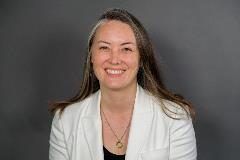About the Center on Aging

Dean Page Announces Interim Director
I am pleased to announce that effective September 1, 2023, Katharine L. Cheung, M.D., Ph.D., will assume the role of Interim Director of the UVM Center on Aging at the Larner College of Medicine, while a search is undertaken to recruit the next Center Director.
Dr. Cheung, a geriatric and palliative nephrologist, currently serves as an assistant professor of medicine on the tenure track in the Division of Nephrology, Department of Medicine. She earned her B.A. at Tufts University, her M.D. and M.Sc. in Physiology and Biophysics at Georgetown University, and Ph.D. in Clinical and Translational Science at UVM. She completed her internal medicine residency, chief residency, and nephrology fellowship at Stanford University before joining the UVM faculty in 2017.
Dr. Cheung’s research and clinical practice focus is on the care of older adults with advanced kidney disease, frailty, cognitive impairment, and serious illness communication. She has published and spoken widely on these topics. She was selected by the American Society of Nephrology to be a Kidney STARS mentor for students, residents and fellows interested in pursuing a career in nephrology. Her research has been funded by the UVM Center on Aging, American Society of Nephrology, National Palliative Care Research Center, Vermont Center for Cardiovascular and Brain Health and Northern New England Clinical and Translational Research Network.
Dr. Cheung is the past president of the Vermont Kidney Association and is a member of the Center on Aging Executive Council. From 2018-2021 she was named a Kornfeld Scholar at the National Palliative Care Research Center. In 2020 she was recognized as the UVM Health Network Medical Group’s Dean’s Excellence in Research Junior Investigator of the Year, and received the Northern New England Clinical and Translational Research Network Research Scholar Award in 2023.
Please join me in congratulating and supporting Dr. Katharine Cheung in her new role and thank her for her service to our college and UVM. We are fortunate to have such a talented and accomplished physician to lead the Center of Aging during the recruitment of a new Center Director.
Sincerely,
Richard L. Page, M.D. Dean
Mission Statement
The mission of the Center on Aging at the University of Vermont is to forge an ongoing collaboration among faculty, students, staff and programs within the University of Vermont, The University of Vermont Medical Center, and the Vermont community
to promote a sense of well being and a high quality of life for older adults. The Center seeks to engage interested parties who wish to partner in the development and execution of programs that facilitate the health and welfare of older adults.
The cornerstones of the Center are:
- To coordinate and support collaborative gerontological and geriatric research on the campus of the University of Vermont
- To provide educational opportunities in gerontology and geriatrics to students, staff, faculty, the lay community, and health care and human service providers throughout the state and region
- To translate research outcomes and educational activities into policy and excellent practice across the medical and human service landscape of the community that we serve
Core Focus of the Center
The education core of the Center will strengthen geriatric and gerontology education of undergraduate, graduate, nursing, and medical students; resident physicians; practicing physicians; nurses; and other health care professionals of all disciplines.
The Center will provide the resources to improve the expertise of all health care and human service providers throughout the state and the region relating to the issues of aging facing residents at various health stages from healthy to the frail
elderly. In addition, the Center will facilitate education on aging issues for the lay community, policy makers, and for those in other professions who interact with older adults.
The research core of the Center will provide an infrastructure
that will facilitate collaboration among investigators at the University including regularly scheduled conferences to assist investigators in the design and analysis of aging-related research. The Center will reflect the University’s initiative
in integrated research and collaboration, bringing basic scientists and clinical researchers together in applied research protocols focused on problems of immediate importance to Vermont’s citizens with age-related diseases.
The
social science and policy core of the Center will drive focused research and consultation to assist in major state policy decisions. Drawing from the diverse strengths of the University, the Center will be a new resource for Vermont, attracting
external funding and forging academic collaborations to address specific questions underlying policy debates.